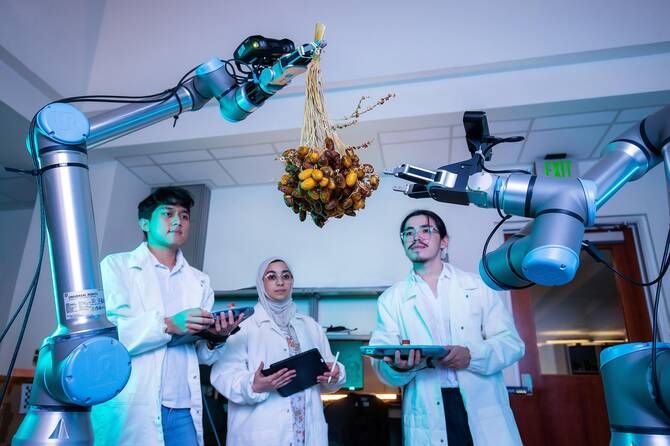HOW A KAUST TEAM IS USING AI TO TRANSFORM DATE HARVESTING IN SAUDI ARABIA

RIYADH: Saudi Arabia is transforming its agriculture sector with advanced robotics aimed at boosting productivity and sustainability.
Artificial intelligence-powered machines are automating date-palm harvesting and managing irrigation, addressing labor shortages while optimizing water use in the Kingdom’s arid climate.
Backed by major investments and ongoing field trials, the country is also positioning itself as a leader in smart farming, with the goal of increasing crop yields and enhancing food security.
A key initiative in this push is a research project led by a team at the King Abdullah University of Science and Technology, which is developing an AI-driven robotic system to support local date farmers.
The project, headed by KAUST Assistant Prof. Shinkyu Park, focuses on automating critical tasks in date palm cultivation — including harvesting, pollination, and tree maintenance. By integrating robotics with AI, the team aims to improve efficiency and deliver higher yields of more nutritious dates.
The research was motivated by the pressing need to modernize and automate traditional practices in Saudi Arabia’s date palm industry, a sector that has long been central to the nation’s food security and economy, Park told Arab News.
He said: “This research project seeks to reduce labor-intensive risks, enhance agricultural efficiency, and align with national priorities by positioning Saudi Arabia as a global leader in agricultural innovation.”
Saudi Arabia is the world’s second-largest date producer, according to the Food and Agriculture Organization, with production topping 1.9 million tonnes in 2024, as per data from the General Authority for Statistics.
But date harvesting is physically demanding. It requires farmers to climb tall trees and rely on years of experience to judge fruit ripeness — a clear opportunity for AI-powered robotics to make a meaningful impact, Park says.
To this end, the KAUST team, with support from the National Center for Palms and Dates, focused on precise date assessment to enable accurate harvesting using robotic systems.
Their research began with a well-established AI model that leverages high-resolution visual sensor data to identify individual dates and, at a later stage of the project, to classify both their species and ripeness — one of the project’s key milestones, Park noted.


